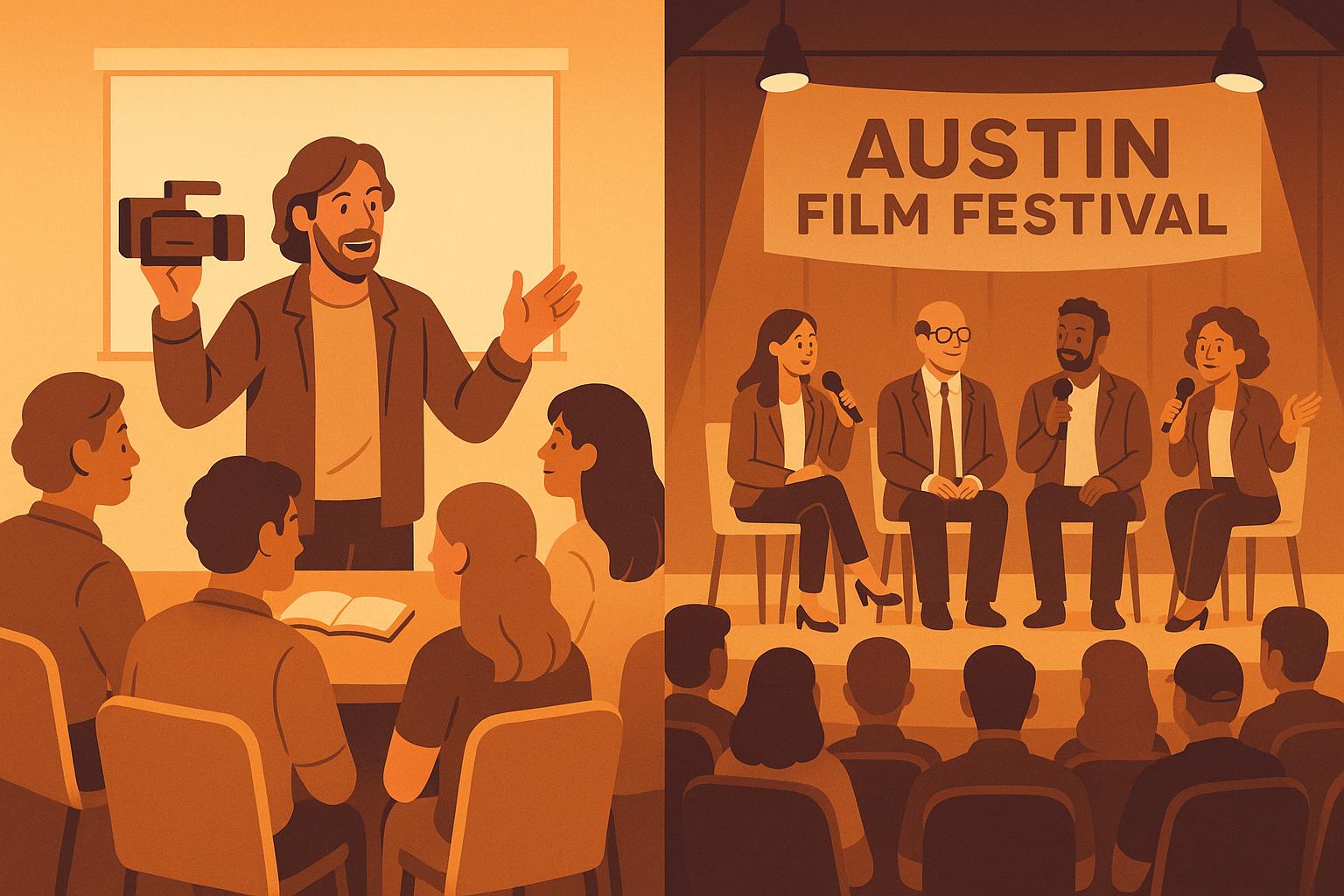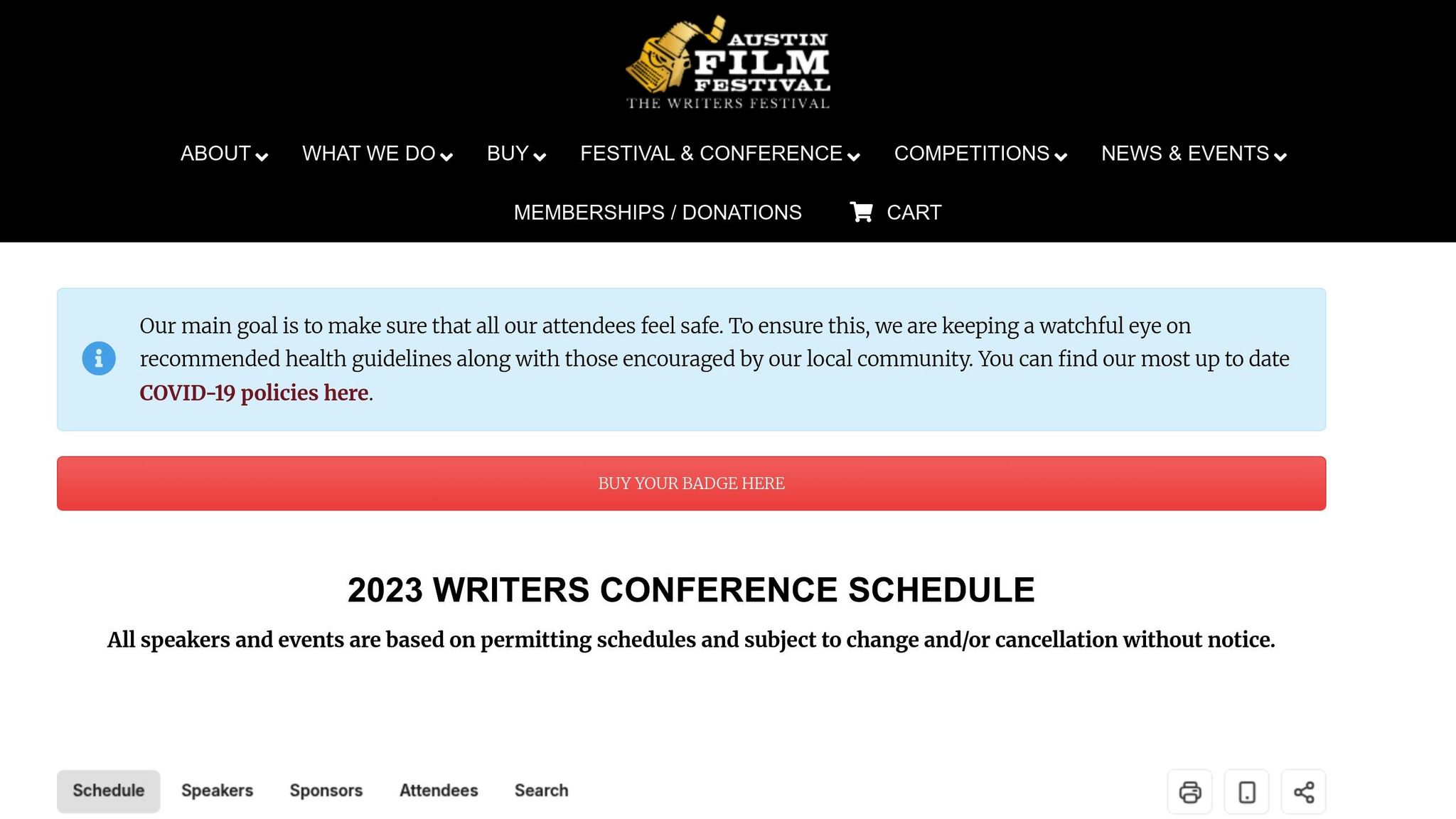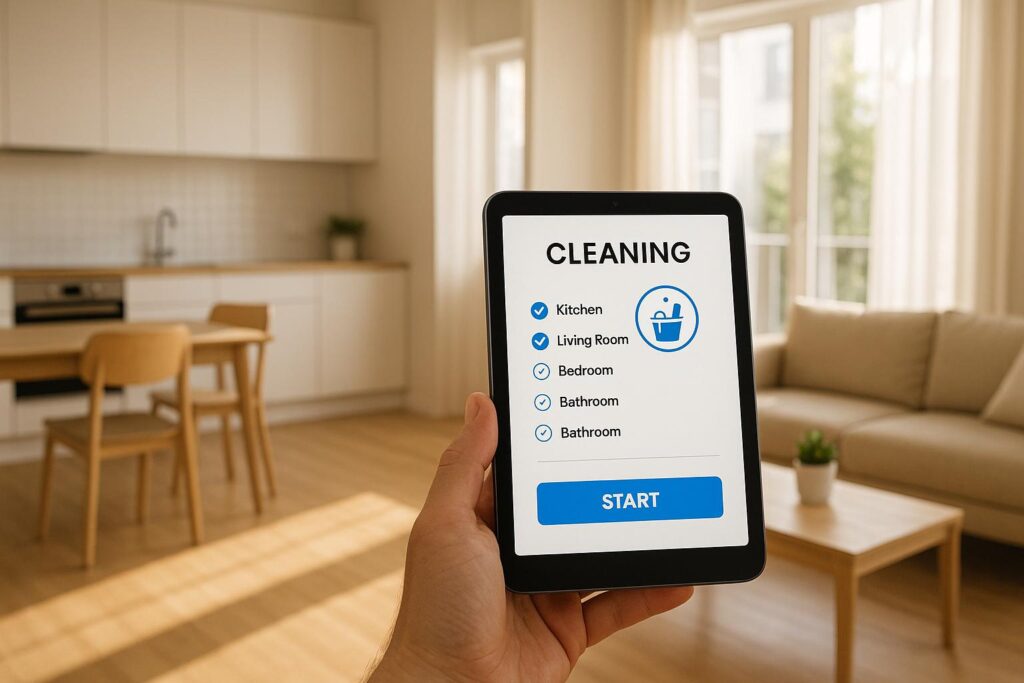Workshops and panels at the Austin Film Festival offer two different ways to learn and grow in filmmaking:
- Workshops: Hands-on sessions focused on building specific skills like screenwriting, directing, or sound design through practice and feedback.
- Panels: Expert-led discussions offering industry insights, career advice, and networking opportunities.
Quick Comparison:
| Aspect | Workshops | Panels |
|---|---|---|
| Learning Style | Hands-on activities | Observational discussions |
| Group Size | Small, intimate groups | Larger, diverse audiences |
| Focus | Skill-building | Industry knowledge |
| Interaction | Direct participation | Q&A with experts |
| Networking | Peer collaboration | Professional connections |
Tip: Combine both formats for the best experience – start with workshops for skill-building, follow with panels for broader insights, and use networking events to connect with others.
2022 Austin Film Festival Writers Conference Full Recap
How Workshops and Panels Differ
Understanding the differences between workshops and panels can help you make the most of your festival experience. At the Austin Film Festival, these two formats vary in structure and purpose, which can influence what you take away from each session.
Structure: Hands-On vs. Discussion-Based
Workshops are interactive sessions where you actively participate, working directly with facilitators to practice and develop skills. On the other hand, panels are discussion-based, featuring experts who share their knowledge and experiences in a moderated format.
Focus: Skill Development vs. Broader Perspectives
Workshops are all about practical learning – perfect for honing specific skills through active participation. Panels, however, provide a chance to hear from industry experts, offering a big-picture view of trends, practices, and insights.
Decide on workshops if you’re looking to roll up your sleeves and learn by doing. Opt for panels if you’re interested in gaining expert perspectives and understanding industry-wide developments.
What You’ll Get from Each Format
Workshop Results: Hands-On Learning and Practice
Workshops focus on building practical filmmaking skills. You’ll participate in exercises that improve technical abilities like screenwriting, directing, or sound design. The small group setting promotes collaboration and provides these benefits:
- Personalized feedback tailored to your work
- Practical exercises to sharpen your skills
- Real-time application of techniques
- Opportunities to enhance your portfolio
Panel Results: Insights and Networking
Panels give you access to expert opinions and networking opportunities. Industry professionals share their experiences, discuss trends, and offer advice. Plus, Q&A sessions let you connect directly with leaders in the field. Here’s what you can expect:
- Engage with experts during Q&A discussions
- Learn about current trends in filmmaking
- Discover career advice from seasoned professionals
- Build valuable industry connections
Below is a quick comparison of what each format offers:
| Aspect | Workshop Benefits | Panel Benefits |
|---|---|---|
| Learning Style | Hands-on activities | Observational and engaging |
| Group Setting | Small, intimate groups | Larger, diverse audiences |
| Interaction Type | Direct participation | Interactive Q&A sessions |
| Primary Outcome | Skill-building | Industry knowledge |
| Networking | Peer collaboration | Professional connections |
Workshops are perfect for developing practical skills through active participation, while panels provide valuable insights and networking opportunities that can help guide your career. Each format offers something unique to support your growth in filmmaking.
sbb-itb-4c99469
Pick the Best Format for You
Match Sessions to Your Goals
Your filmmaking goals should guide your choice between workshops and panels. If you’re aiming to sharpen skills like screenwriting or directing, workshops are a great fit. These smaller, interactive sessions offer hands-on practice and direct feedback, helping you apply techniques right away.
Panels, on the other hand, are better suited when you want to:
- Stay updated on industry trends and market demands
- Expand your professional network through conversations
- Hear diverse perspectives from experts in your field
- Learn career strategies from seasoned filmmakers
By combining both formats, you can create a balanced and enriching festival experience.
Mix Both Types for Best Results
Blending workshops and panels can help you get the most out of your time at the festival. Here’s a suggested schedule to guide your planning:
| Time of Day | Recommended Format | Benefits |
|---|---|---|
| Morning | Workshops | Best time for active, hands-on learning |
| Afternoon | Panels | Great for absorbing insights and trends |
| Evening | Networking Events | Perfect for applying what you’ve learned and making connections |
To make the most of this mix, keep these strategies in mind:
1. Start with Skill Development
Kick off your day with workshops that focus on your key areas of growth. This lets you dive into practical learning while your energy is high.
2. Add Context with Panels
After workshops, attend panels that provide a broader industry perspective. For example, if you join a morning screenwriting workshop, follow it up with an afternoon panel discussing market trends in script development.
3. Use Insights for Networking
Take what you’ve learned from workshops and panels into evening networking events. Use panel Q&As to connect with professionals who share your interests or expertise.
Conclusion: Plan Your Festival Schedule
Plan your Austin Film Festival experience by checking the program about two weeks in advance to pinpoint sessions you don’t want to miss.
Here’s a simple way to organize your day:
| Time Block | Focus Area | Suggested Approach |
|---|---|---|
| 8-10 AM | Skill Building | Pick smaller workshops for hands-on learning |
| 10 AM-12 PM | Industry Insights | Attend panels featuring well-known speakers |
| 1-3 PM | Niche Topics | Combine workshops and panels tailored to your goals |
| 3-5 PM | Networking | Join interactive sessions or Q&A panels |
To make the most of your day:
- Take short breaks to recharge
- Stay open to last-minute session changes
- Jot down important insights
- Connect with speakers on LinkedIn within a day
This plan helps you balance learning and networking while making the most of your festival experience.
FAQs
How do I decide between attending a workshop or a panel at the Austin Film Festival to align with my career goals?
Choosing between a workshop and a panel at the Austin Film Festival depends on what you’re looking to gain from the experience. Workshops are typically hands-on and interactive, offering in-depth guidance on specific skills like screenwriting, directing, or pitching ideas. They’re ideal if you want personalized feedback or practical tools to advance your craft.
Panels, on the other hand, are discussion-based sessions featuring industry professionals who share their insights, experiences, and advice. These are great for gaining a broader understanding of the film industry, learning about trends, and hearing success stories that can inspire and guide your journey.
If your goal is to actively develop your skills, go for a workshop. If you’re looking to expand your knowledge or network with experts, a panel might be the better choice. Either way, both options offer valuable opportunities to grow and connect at the festival.
How can I effectively network during the Austin Film Festival, especially after attending workshops and panels?
Networking at the Austin Film Festival can be a rewarding experience if approached thoughtfully. After attending workshops and panels, take the opportunity to engage with speakers, moderators, and fellow attendees. Start by introducing yourself and mentioning something specific you enjoyed or learned during the session – it’s a great conversation starter.
Make sure to attend social events, mixers, or informal gatherings organized by the festival. These are prime opportunities to meet industry professionals in a more relaxed setting. Always carry business cards or have your contact information easily accessible, and don’t hesitate to connect on platforms like LinkedIn after the event to maintain relationships.
Lastly, be genuine and approachable. Authentic connections often lead to lasting professional relationships, so focus on meaningful conversations rather than simply handing out cards.
What workshops or panels at the Austin Film Festival are best for beginners in filmmaking?
The Austin Film Festival offers a variety of workshops and panels tailored to filmmakers at all levels, including beginners. For those just starting out, look for introductory workshops that focus on the basics of screenwriting, directing, or pitching ideas. Panels featuring industry professionals often provide valuable insights into breaking into the film industry, sharing practical tips and personal experiences.
To make the most of your experience, check the festival schedule for sessions labeled as beginner-friendly or designed for newcomers. These are great opportunities to build foundational knowledge and connect with others who are also starting their filmmaking journey.






